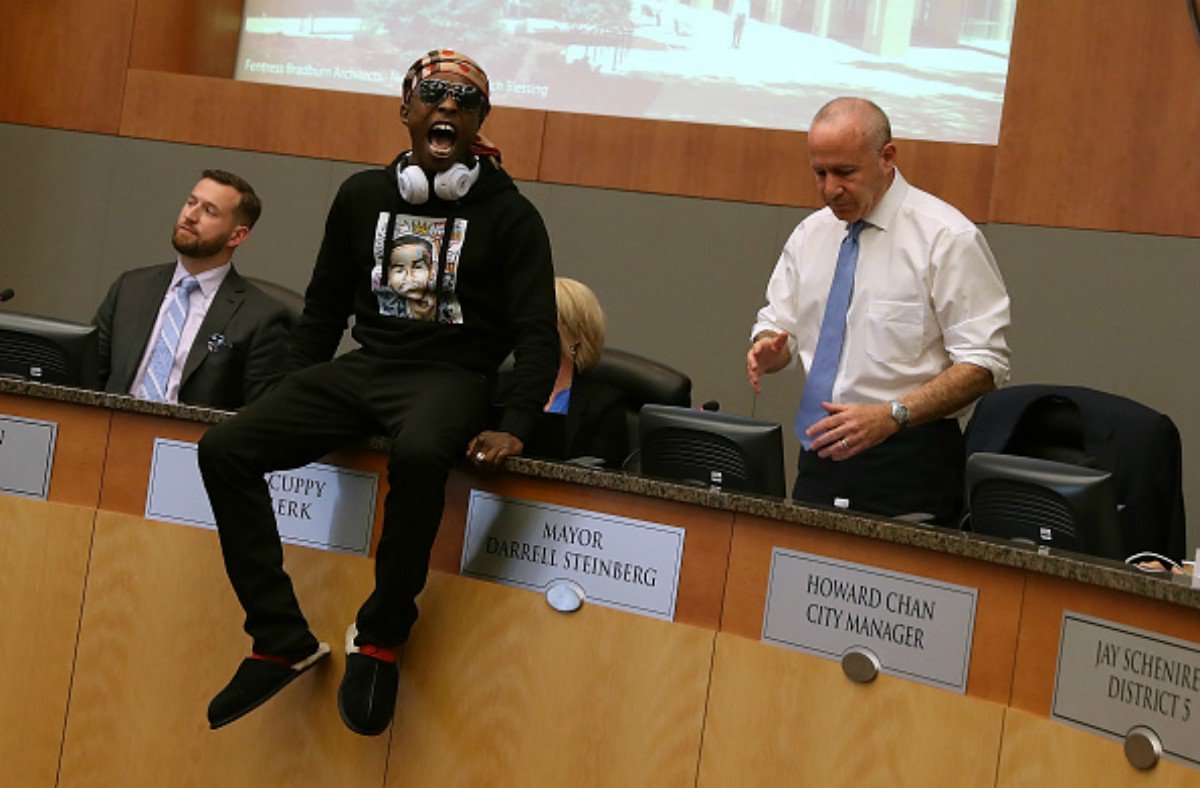[ad_1]
Since the death of his brother Stephon, Stevante Clark has been dealing with mental health issues that have become increasingly difficult for Sacramento authorities to manage.
However, the police are adamant about enlisting the help of others to handle Stevante, a tactic used to help deescalate confrontations with the 25-year-old who has attacked police several times with volatile words and actions, reports The Sacramento Bee.
READ MORE: Is Beyoncé About to Bless (and Resurrect) a NOLA Church?
Still, many have wondered why the police have failed to call for Clark to be placed on a mental health hold. Stevante has become the subject of concern in the community ever since his brother was gunned down in the backyard of his grandmother’s home with a cell phone in hand that police mistook as a gun.
A grieving Stevante was seen in the weeks following Stephon’s death on the news defiantly disrupting a city council meeting, distraught and struggling to deal with his loss.
He even sought mental health treatment according to The New York Daily News, and met with Mayor Darrell Steinberg who told him it’s “nothing to be ashamed of” and “we’ll help you. Everybody wants to help you.”
Mental health advocates say however that not enough is done following the aftermath of shootings — especially in Black communities — to help people come to grips with the turmoil following such traumatic situations.
A textbook case of how the system falls short
In April police were called to Stevante’s home for a welfare check after he made several unintelligible 911 calls “saying random things,” said Sacramento police Lt. Roman Murrietta.
Clark “was yelling at a police officer who had his cruiser up on the lawn and was behind his (car) door trying to get Stevante to come out,” said Samantha Urke, Clark’s roommate, who witnessed the exchange. “(Stevante) was yelling things like, ‘F—ing pig … come and get me.’”
Police didn’t arrest him nor did they detain him for a mental health hold.
“For Black people, you don’t call the police first for mental illness,” said Betty Williams, president of the Sacramento NAACP.
“The civil rights piece of the killing of Stephon Clark, that hasn’t gone away,” Williams said. “But this additional conversation has just sprung out.”
READ MORE: Two arrested in fatal shooting after Georgia graduation
According to the Bee, Sacramento police requested 1,679 involuntary holds for psychiatric evaluations — averaging nearly five a day — and fielded 3,348 incidents related to mental health, according to data provided by the department for 2017.
Police Capt. Pamela Seyffert, said Sacramento’s treatment of mental illness is a “revolving door” that leaves officers discouraged.
“People agree that they don’t want police coming into certain situations, and we get that, but if we are the only ones that can do it … then we have to do it,” she said. “There is no place where we can take them and they are actually going to get long-term help.”
Clark admitted in a Facebook post in May that he recently was diagnosed with bipolar disorder and he spoke about the difficulties he’s had after his brother’s death.
“I was a human before this,” he told reporters after Stephon Clark’s funeral. “I don’t eat. I don’t sleep. Imagine being famous over the death of your relative. They don’t see you. They see your brother. They see a death.”
READ MORE: 2018 Billboard Music Awards Recap: Who won big and who got robbed
Clark has presented a challenge to police and those closest to him, including his roommate.
He caused $3,300 worth of damage to the home he stays in with his roommate and she started a Go Fund Me page to raise money for what she lost. Police gave her $2,500 in cash in exchange for signing a waiver not to bring legal action against the city.
In early May, Clark was placed on a mental health hold after being detained in a Starbucks. He was held for 10-days at a psychiatric facility, he said in a Facebook post.
“What I learned out of this whole month … everyone in this world has either two things, either a price or an agenda, Stevante said. “I have been treated like s— by everybody. …. They could have done everything differently. They should have killed me when they had the chance.”
[ad_2]
Source link

